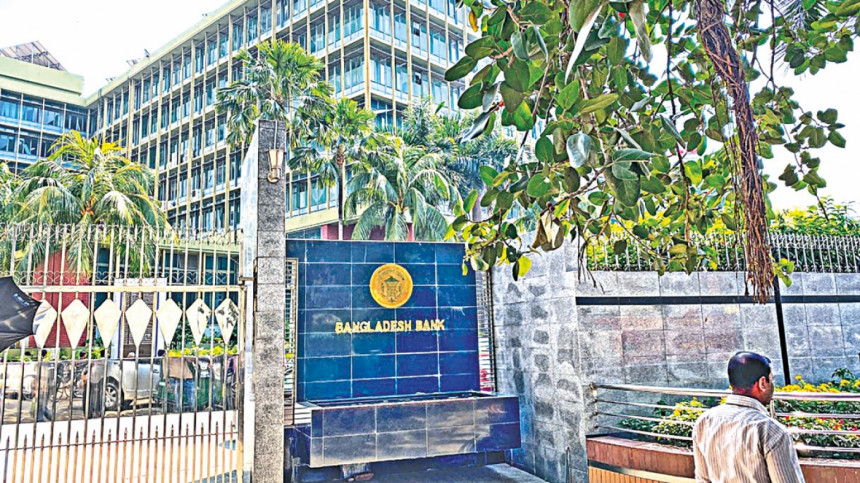Banks’ risky loans thrice as large

After the sudden drop in Bangladesh's official foreign exchange reserves on July 13, another rude shock awaits: as per IMF conditions, the banking sector's distressed assets will be published, in what would make for a grim reading about the industry's health.
As per international best practices, distressed assets are reported alongside non-performing loans (NPLs) to reflect the true state of the banking sector's stressed assets.
Distressed assets comprise classified loans, rescheduled loans, restructured written-off loans and loans that were unclassified by court order. All four categories of loans are dicey for a bank and must be adequately provisioned.
The Bangladesh Bank used to report the sector's distressed assets in its annual financial stability report that comes out every June, and the International Monetary Fund has stipulated that the practice is restarted as per the conditions agreed for the $4.7 billion loan.
"The COVID-19 financial support policies are set to expire in December 2022. As the unwinding of these policies may lead to a gradual realisation in the losses in the banking system, asset classifications, in particular restructured loans, should accurately reflect current balance sheet risks and distressed assets be adequately provisioned," said the IMF staff report published in February.
The annual financial stability report for 2022 is yet to be published as the BB is still gathering data on the banking sector's restructured written-off loans and loans that were unclassified by court order, The Daily Star has learnt from central bank officials informed with the proceedings.
It is yet to work out the total amount of rescheduled loans as well.
In recent years, about 10 percent of total outstanding loans were rescheduled. At the end of last year, total outstanding loans stood at Tk 1,477,788 crore. It can then be assumed that the total volume of rescheduled loans would not be less than Tk 146,778 crore.
The total volume of restructured written-off loans would be in the neighbourhood of Tk 45,000 crore, said a BB official working on the calculations.
At the end of 2022, the banking sector's classified loans amounted to Tk 120,657 crore.
Going by the numbers, it can be said that the banking sector's distressed assets would not be less than Tk 300,000 crore.

Working out the exact volume of loans that were unclassified by court orders would be a time-consuming affair, so the central bank would use a ballpark figure for this such that it can produce the report in good time for the IMF staff review.
The first review of the programme will take place in October, when the IMF staff team will assess the programme's quantitative targets and progress of reform implementation and take a call on whether the next tranche of about $476.27 million can be released.
Bangladesh is set to miss two of the six quantitative targets set for the first half of 2023, with one of them being a mandatory condition, The Daily Star has learnt from finance ministry officials with knowledge of the situation.
The government has failed to maintain minimum net international reserves (NIR) of $24.46 billion at the end of June. This was a mandatory condition. The NIR was hovering around $21 billion.
The minimum tax revenue target, another vital condition, will also be missed. The government needed to collect at least Tk 345,630 crore in tax revenue in fiscal 2022-23.
Last fiscal year, the National Board of Revenue collected Tk 325,272 crore. In the first nine months of the fiscal year, non-NBR tax collection was Tk 6,014 crore, which is just one-third of the year's target.
It is highly likely that non-NBR tax collection in the last three months would be Tk 14,344 crore.
The rest of the quantitative targets like the floor on budget, social spending and development capital investment and the ceiling on reserve money were comfortably met.
The government is also poised to implement all six of the reform measures for June 2023, the finance ministry officials said. And three of the reform measures set for the year-end would be implemented ahead of schedule.
The reform measures for June include the adoption of an interest rate corridor system, reporting official reserve assets as per the IMF's BPM6 definition and introduction of a market-determined exchange rate.
The central bank was supposed to complete the pilot risk-based supervision action plan and publish banks' distressed assets in the annual financial stability report as well.
The finance ministry has also adopted tax revenue measures yielding an additional 0.5 percent of GDP in fiscal 2023-24's budget, the officials said.
The government was supposed to adopt a periodic formula-based price adjustment mechanism for petroleum products by the end of the year and that would be rolled out before then.
The Bangladesh Bureau of Statistics was supposed to publish quarterly GDP data by December and that would be done by September.
The finance ministry was supposed to submit to the parliament the Bank Companies (Amendment) Act 2020 and the Finance Companies Act 2020 drafted in line with best practices by September.
The Bank Companies (Amendment) Act 2020 has already been passed in the parliament.
Should a country fail to meet the conditions under an IMF programme, it must furnish explanations for coming up short. If the IMF staff mission deems the explanations reasonable, they can authorise the release of the next instalment.
The government would be blaming the prolonged Ukraine war for its failure to meet two key targets, the finance ministry officials said.
"Given that we would be implementing some of the reform measures ahead of schedule, we are hopeful that the IMF staff mission would be giving us a waiver," said one of the officials on the condition of anonymity to speak candidly on the issue.


 For all latest news, follow The Daily Star's Google News channel.
For all latest news, follow The Daily Star's Google News channel. 








Comments